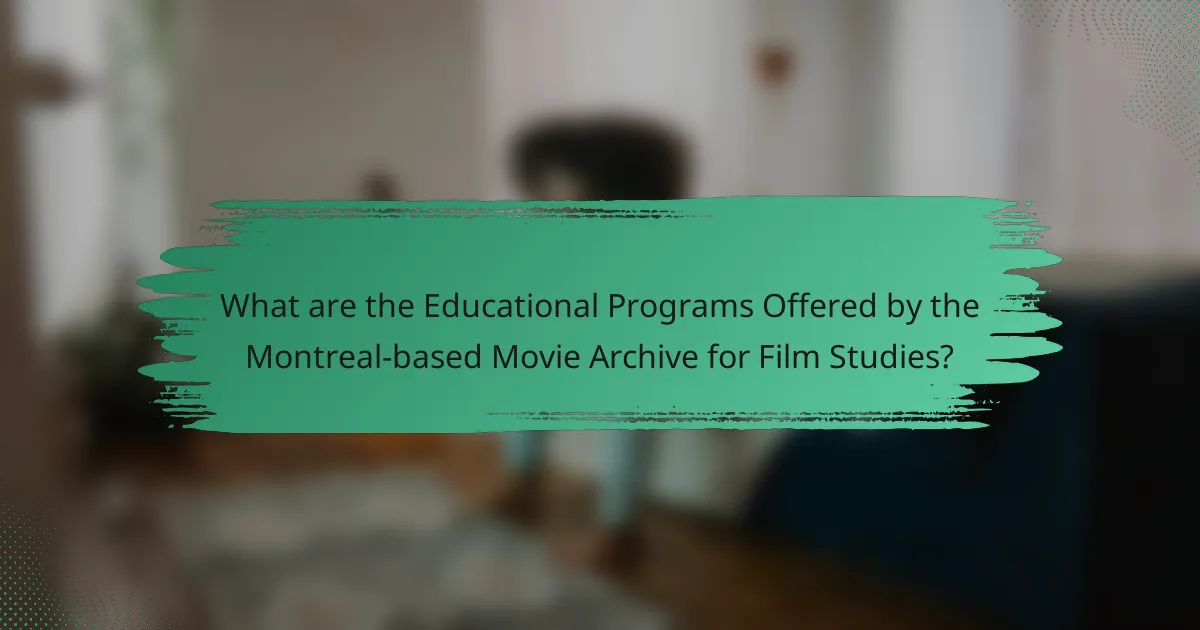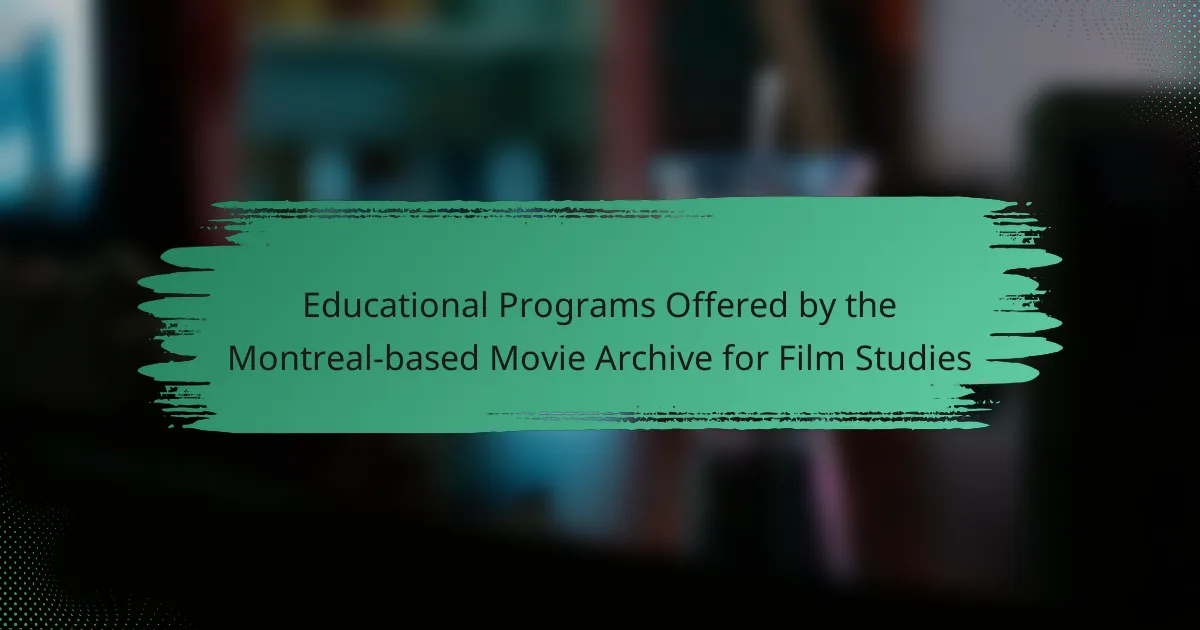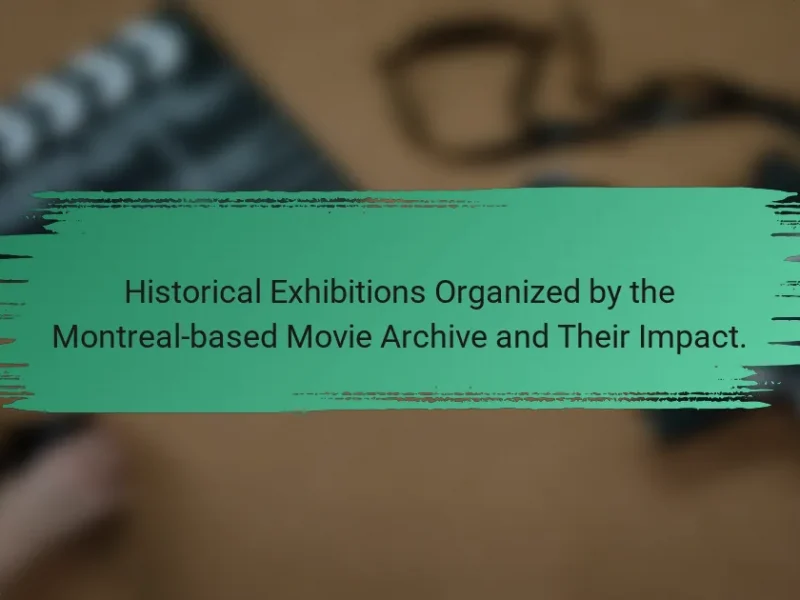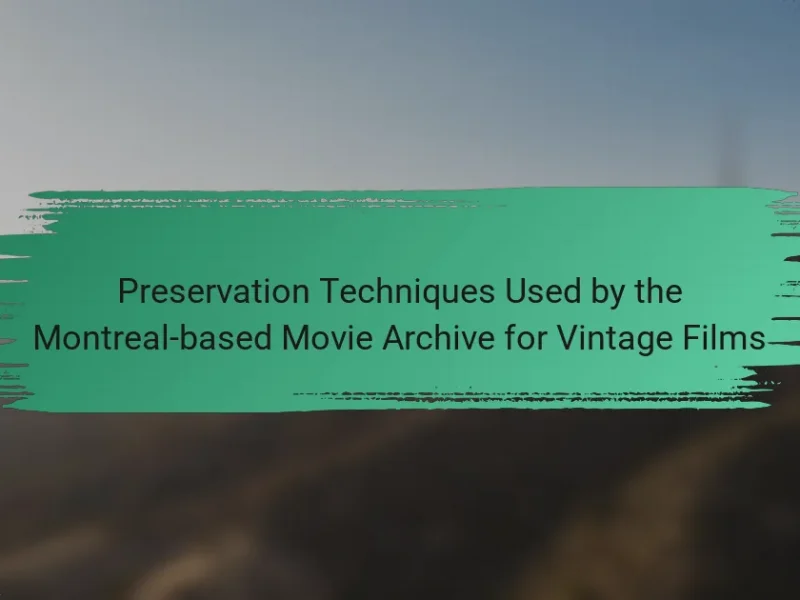The Montreal-based Movie Archive for Film Studies provides a range of educational programs designed to enhance knowledge in film studies. These programs include workshops focused on film preservation and analysis, internships that offer practical experience in film archiving, and film screenings that showcase both classic and contemporary films. Additionally, the archive hosts lectures featuring industry professionals, catering to students, educators, and film enthusiasts. Through these initiatives, the archive aims to promote a deeper understanding of film and its preservation.

What are the Educational Programs Offered by the Montreal-based Movie Archive for Film Studies?
The Montreal-based Movie Archive for Film Studies offers various educational programs. These programs include workshops, internships, and film screenings. Workshops cover topics such as film preservation and analysis. Internships provide hands-on experience in film archiving. Film screenings often feature classic and contemporary films. The archive also hosts lectures by industry professionals. These educational initiatives aim to enhance film studies knowledge. They cater to students, educators, and film enthusiasts alike.
How do these educational programs enhance film studies?
Educational programs enhance film studies by providing access to curated film collections and expert-led workshops. These programs facilitate hands-on learning experiences. Students engage with a diverse range of films, fostering critical analysis skills. Workshops often include discussions on film theory and history. Access to archival materials allows for in-depth research opportunities. This exposure enriches students’ understanding of cinematic techniques and cultural contexts. Collaboration with industry professionals enhances networking opportunities. Overall, these educational programs promote a comprehensive and practical approach to film studies.
What specific skills do students gain from these programs?
Students gain critical skills in film analysis, production techniques, and historical context from these programs. They learn to evaluate films critically, understanding narrative structure and cinematography. Practical skills include camera operation, editing, and sound design. Students also develop research skills specific to film studies. They gain experience in archival research and preservation techniques. Collaborative projects enhance teamwork and communication skills. These competencies are essential for careers in film and media industries.
How do the programs cater to different learning styles?
The programs cater to different learning styles by incorporating various teaching methods and materials. Visual learners benefit from film screenings and visual aids. Auditory learners engage through discussions and lectures. Kinesthetic learners participate in hands-on activities, such as film production workshops. The curriculum includes diverse resources, like readings and multimedia content, to accommodate all styles. Research indicates that varied instructional approaches enhance learning outcomes. A study by Fleming and Mills shows that addressing multiple learning styles can improve retention and understanding.
What types of educational programs are available?
The Montreal-based Movie Archive for Film Studies offers various educational programs. These programs include workshops, seminars, and film screenings. Workshops focus on practical skills in film analysis and production. Seminars cover theoretical aspects of film studies and history. Film screenings often feature classic and contemporary films with discussions. Additionally, the archive may provide online courses for broader accessibility. Each program aims to enhance understanding and appreciation of cinema.
What are the key characteristics of workshops offered?
Workshops offered by the Montreal-based Movie Archive for Film Studies are interactive educational sessions. They focus on various aspects of film studies, including theory and practical skills. Participants engage in hands-on activities that enhance learning experiences. Workshops are typically led by experienced professionals in the film industry. They provide opportunities for networking and collaboration among participants. Sessions often include discussions, screenings, and critiques to deepen understanding. The workshops are designed for various skill levels, accommodating beginners to advanced learners. Feedback from previous participants indicates high satisfaction and valuable insights gained.
How do lectures differ from practical sessions in these programs?
Lectures and practical sessions in educational programs differ significantly in their approach to learning. Lectures primarily focus on theoretical knowledge. They involve instructors presenting information to students in a structured format. Students typically listen and take notes during these sessions. Practical sessions emphasize hands-on experience and application of skills. They allow students to engage directly with the subject matter. In practical sessions, students often work on projects or assignments that require active participation. This experiential learning fosters skill development and deeper understanding. Research shows that practical sessions enhance retention of knowledge compared to traditional lectures.
Who can benefit from these educational programs?
Students pursuing film studies can benefit from these educational programs. These programs offer hands-on experience and theoretical knowledge. They are designed for individuals interested in film history, production, and analysis. Professionals in the film industry can also gain insights and skills. Educators seeking to enhance their curriculum may find valuable resources. Additionally, film enthusiasts looking to deepen their understanding are welcome. Research indicates that targeted educational programs improve knowledge retention and practical skills. This supports the effectiveness of such initiatives in film studies.
What age groups are targeted by the programs?
The programs target various age groups, including children, teenagers, and adults. Specifically, they offer workshops for children aged 6-12. Teenagers aged 13-17 are also included in the program’s focus. Additionally, [censured] learners are catered to through specialized courses. This multi-age approach allows for diverse learning experiences. The educational programs aim to engage participants at different life stages. By addressing varied age demographics, the programs enhance community involvement in film studies.
How do these programs accommodate beginners versus advanced learners?
The educational programs offered by the Montreal-based Movie Archive for Film Studies accommodate beginners and advanced learners through tailored curricula. Beginners receive foundational courses that introduce essential film concepts and techniques. These courses often include hands-on workshops and guided discussions to enhance understanding. Advanced learners are provided with specialized classes that delve into complex theories and advanced filmmaking techniques. These classes often involve critical analysis and project-based learning to foster deeper engagement. The programs also offer mentorship opportunities for advanced learners to refine their skills with industry professionals. Feedback mechanisms are in place to ensure that both beginner and advanced learners receive support tailored to their skill levels.
What partnerships or collaborations enhance these educational offerings?
Partnerships with local universities enhance the educational offerings of the Montreal-based Movie Archive for Film Studies. Collaborations with institutions like McGill University and Université de Montréal provide access to academic resources. These partnerships facilitate guest lectures from renowned filmmakers and scholars. Joint workshops and seminars are organized to enrich student learning experiences. The archive also collaborates with film festivals to offer practical exposure to students. Such collaborations create networking opportunities for students in the film industry. These partnerships are essential for fostering a comprehensive educational environment. They contribute to the archive’s mission of promoting film studies in Montreal.
Which institutions or organizations are involved?
The institutions involved include the Montreal-based Movie Archive for Film Studies, local universities, and cultural organizations. The Movie Archive collaborates with educational institutions to offer film studies programs. Local universities may provide academic credits for courses developed by the Archive. Cultural organizations often partner to enhance the educational experience through workshops and screenings. These collaborations help to broaden access to film education in the community.
How do these partnerships influence the curriculum?
Partnerships influence the curriculum by integrating industry standards and real-world applications into educational programs. These collaborations allow for the inclusion of current trends in film studies. They also facilitate access to resources, such as archival materials and expert guest speakers. Students benefit from hands-on experiences that enhance their learning. Additionally, partnerships often lead to the development of specialized courses tailored to market needs. This alignment with industry expectations improves student employability. Research shows that programs with active partnerships see higher student engagement and satisfaction. The Montreal-based Movie Archive’s collaborations exemplify this trend in film studies education.
What are the enrollment processes for these programs?
The enrollment processes for the educational programs offered by the Montreal-based Movie Archive for Film Studies typically involve several steps. Prospective students must first complete an online application form available on the institution’s website. This form requires personal information and details about the applicant’s educational background. After submitting the application, candidates may need to provide supporting documents such as transcripts and letters of recommendation.
Some programs may also require an interview as part of the selection process. Applicants are then notified of their admission status via email. Accepted students must confirm their enrollment by paying a deposit by a specified deadline. This process ensures that candidates are adequately assessed and that the program can accommodate them effectively.
What prerequisites are required for students?
Students must typically have a high school diploma or equivalent for admission. Some programs may require specific coursework in film studies or related fields. Applicants might also need to submit a portfolio showcasing their work. Additionally, letters of recommendation may be required in some cases. Some programs may have minimum GPA requirements for acceptance. Proficiency in English is often necessary, especially for non-native speakers. Certain advanced programs might require prior undergraduate degrees in relevant disciplines. Meeting these prerequisites ensures that students are adequately prepared for the coursework.
How can prospective students apply for these educational programs?
Prospective students can apply for educational programs offered by the Montreal-based Movie Archive for Film Studies through their official website. The application process typically involves filling out an online application form. Students must provide personal information, educational background, and relevant experience. Some programs may require submission of a portfolio or a statement of purpose. Deadlines for applications vary by program, so it is essential to check the specific dates. Additionally, applicants may need to pay an application fee. The website provides detailed instructions and guidelines for each program, ensuring clarity in the application process.
What practical tips can help maximize the experience in these programs?
Engaging actively with instructors enhances the learning experience in educational programs. Participating in discussions fosters a deeper understanding of film studies. Networking with peers can lead to valuable collaborations and insights. Attending all scheduled screenings and lectures ensures comprehensive exposure to the curriculum. Taking detailed notes during sessions aids in retention and future reference. Utilizing available resources, such as library archives and online databases, enriches research opportunities. Seeking feedback on assignments promotes continuous improvement. Finally, dedicating time for self-study reinforces concepts learned in the program.
The main entity of the article is the Montreal-based Movie Archive for Film Studies, which offers a variety of educational programs including workshops, internships, and film screenings. These programs aim to enhance knowledge in film studies by providing hands-on experiences, access to curated film collections, and expert-led discussions. Participants can gain critical skills in film analysis and production, catering to different learning styles and age groups. The article also details the enrollment processes, prerequisites, and the impact of partnerships with local universities on the curriculum. Overall, these initiatives promote a comprehensive understanding of cinema for students, educators, and film enthusiasts.


